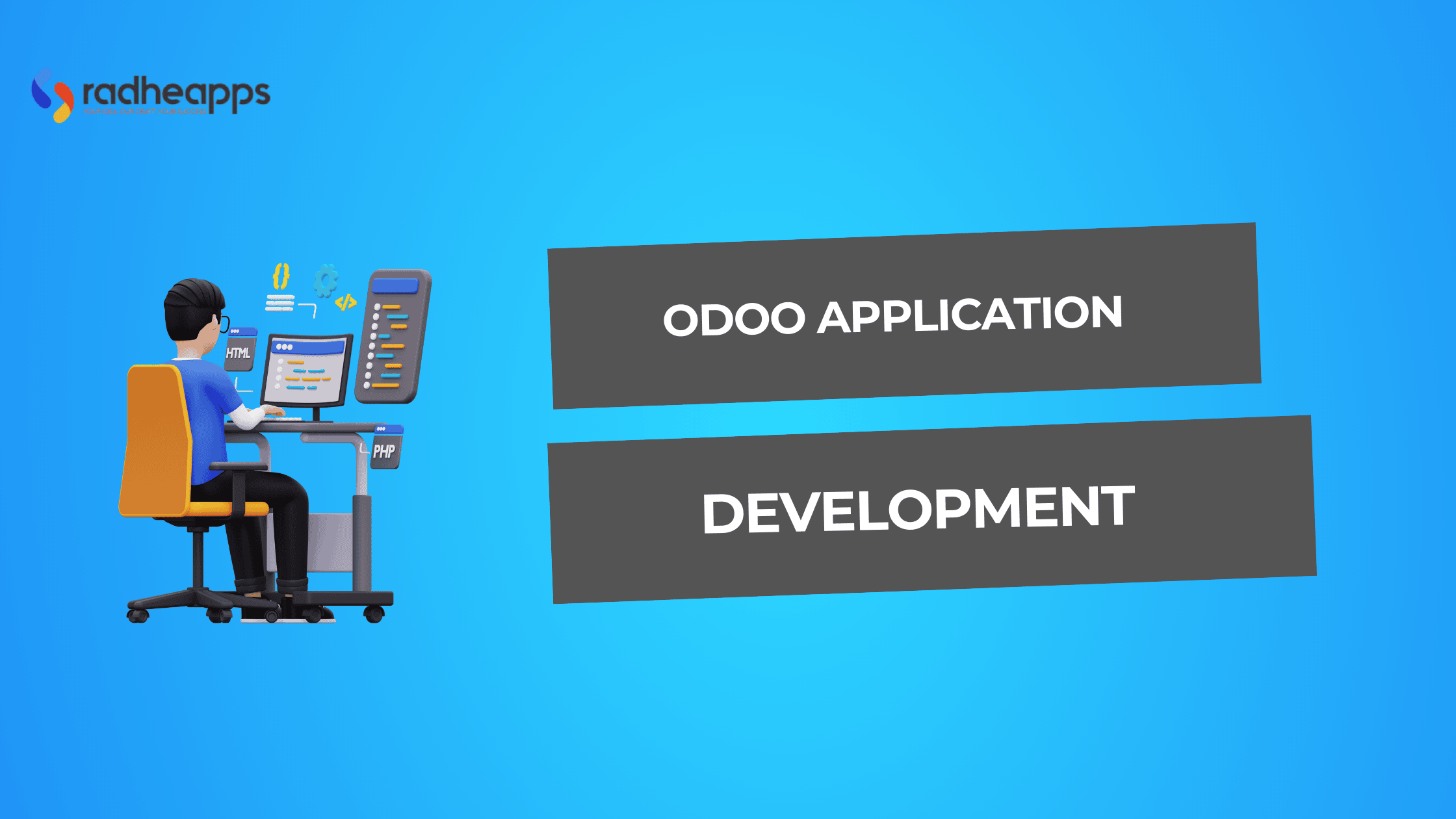It can be exhausting to switch between multiple apps and handle manual tasks.
That’s why so many businesses turn to Odoo. It’s an all-in-one platform that combines everything: CRM, inventory management, accounting, eCommerce, and more. It does it all, and the best part? You can customize it to fit your exact needs.
But here’s the thing: setting up and tailoring Odoo takes skill. That’s where RadheApps comes in. We handle everything: streamlining workflows, creating custom modules, migrating data, and training your team.
Why us? Because we get your challenges and provide solutions that save time, cut costs, and make life easier.
Ready to make your business run smoothly with Odoo? Contact us today.
Now, let’s look into what Odoo application development means!
What is Odoo Application Development?
Odoo is an all-in-one business software that includes apps like CRM, eCommerce, accounting, inventory, point of sale, project management, etc. It provides a modular framework that lets developers create applications according to specific business needs.
The main two editions of the platform include:
Community version: Free and open-source.
Enterprise version: Offers extra features and services for a subscription fee.
Benefits of Odoo Application Development
Odoo offers several benefits that enhance business operations and efficiency.
Here are eight of them:
Centralized Management
Odoo integrates sales, inventory, accounting, and human resources modules into a centralized platform. With this integration, business processes get managed.
This integration offers access to critical data in real time. It enables better collaboration between departments and informed decision-making.
Customization and Scalability
The modular architecture of Odoo allows businesses to customize the ERP system. This customization can happen according to specific needs. Businesses can start their work with the modules they need, add more as they grow, and only pay for what they need.
This makes it suitable for both small medium-sized enterprises and larger organizations.
Improved Productivity and Efficiency
Odoo automates repetitive tasks and workflows, which reduces manual labor. This automation allows employees to focus on strategic activities. which enhances productivity and operational efficiency.
For instance, automated inventory management and concurrent reporting streamline processes and reduce errors.
Live Data and Analytics
When you use Odoo, your company can track its key performance indicators. These indicators analyze data in real time and make decisions based on that data. This helps to make adjustments to trends, bottlenecks, or areas in need of improvement.
All this improves agility.
Cost-Effectiveness
Odoo saves the licensing fees associated with proprietary software. These operations become centralized. This gives way to substantial cost reductions in terms of mistakes by humans and better use of workflows.
Its scalability makes for a better return on investment (ROI), as businesses can adjust to the system without incurring other costs.
User-Friendly Interface
Odoo has an intuitive interface. This makes navigation through various applications easy. This minimizes the learning curve for employees. That is because wide adoption of the system takes place within the organization.
Cloud-Based Deployment
Odoo is available in both on-premise and cloud versions. It includes lesser infrastructural costs. That has access from anywhere in the world using any device with an internet connection.
It should also have auto-updates and better data security.
Active Community Support
The dynamic and vibrant community in Odoo contributes to ongoing improvements. There is also a sheer number of third-party applications. It promises access to constant support and resources. They are meant to heighten the functionalities of this software.
How to Begin Odoo Application Development
The Odoo app development starts with the basic three-step structure. Here you will find a detailed overview of all of it:
Install and Set Up the Odoo Platform:
System Requirements: You should ensure that your system meets the requirements for running Odoo, which involves a compatible operating system, Python, PostgreSQL, RAM, and disk space.
Installation: Download and install Odoo from the official website or use a cloud-based solution. Follow the instructions for setting up your environment. Upon installation, you must create a new database and configure initial settings like company information.
Accessing Odoo: To log in, after installation, access Odoo via a web browser (usually on http://localhost:8069), log in to your administrator account, and proceed to configure modules such as CRM, Sales, Inventory, and Accounting.
Review Odoo Documentation for Development Basics
Official Tutorials: The starting point is the official documentation provided by Odoo regarding comprehensive tutorials, starting from the server and web frameworks, creating modules, making modules from scratch, or changing existing applications.
Development Framework: Consider the key concepts relating to the Odoo Development framework. This includes defining module data, implementing security measures while developing, and writing practical unit tests about code reliability.
Incremental Learning: Tutorial on building a simple module step by step. This helps learn the basics before moving to more complex functionalities.
Explore the Odoo Community for Resources and Support
Community Forums: Participate in Odoo community forums and discussion forums where you can ask questions, share an experience, or request an advisory from other developers.
Online Resources: Use online resources, blogs, video tutorials, and webinars that give insight into how best to apply your skills at Odoo.
Collaboration: Engage the services of other developers to work with or become a local user group member, expanding your learning curve as you get practical knowledge from its real-world application.
Key Aspects of Odoo Customization
The benefit of knowing Odoo’s customization aspects is not about technical skills, it is beyond that. It is about leveraging Odoo’s architecture and making the most well-informed decision for the company.
Here are six in-depth key aspects to help you do so:
User Interface (UI) Customization:
Brand Alignment: The customization of UI can help companies express their brand using colors, logos, and fonts. Consistency in branding is always trusted and recognized by users.
Usability: An excellent interface always makes it easier for users to navigate. Some customizations could be changing menus, making shortcuts, and hiding the options that aren’t needed for workflow optimization.
Workflow Tailoring:
Process Alignment: Configured workflows ensure that Odoo caters to unique business processes, making operations faster and more error-free. Custom workflows can automate repeat tasks such as sending reminder emails or updating the number of available items automatically.
Automation: Automation features by Odoo enable businesses to save time and minimize human errors by automating routine operations like invoice generation and inventory management.
Module Development:
Custom Modules: The modular architecture of Odoo allows for the creation of custom modules to be developed for new features or alterations of existing ones. Such capabilities are useful for firms dealing with a niche process not accounted for in standard applications.
Changing existing modules: In most cases, firms can modify existing ones to suit their needs more efficiently rather than developing new ones. For example, by modifying the invoicing or CRM module to add functionality.
Reporting and Analytics:
Customized Reports: A Tailored report will help businesses focus on key metrics that matter most to their operations. Customized reporting tools ensure that decision-makers have access to relevant data for informed choices.
Integration Capabilities:
Third-Party Integrations: Odoo can integrate with third-party applications that enhance its functionality and allow for smooth data exchange between platforms. This is an essential feature in business operations where the need for streamlining operations across systems is necessary.
Continuous Support and Improvement:
Ongoing Customization: As business needs change, ongoing customization ensures that Odoo stays in line with changing requirements. Partnering with experienced Odoo consultants can help ensure ongoing support and enhancements.
Challenges in Odoo Application Development and Solutions
When you implement Odoo for application development, you will face many challenges. Here are seven common challenges you should be aware of:
Scalability and Performance:
Challenge: A big enterprise has to deal with a large volume of data and many concurrent users, causing performance issues if this is not well managed, resulting in slow response time and system crashes.
Solutions: To achieve scalability, dedicated servers or cloud solutions are sometimes needed to provide ample storage and processing power. Performance optimization techniques, including database indexing and load balancing, also ensure that high user loads can be managed efficiently.
Customization Complexity:
Challenge: If you want to meet specific business needs, the Odoo customization might seem complex. Extensive customizations may complicate future updates and affect system stability.
Solutions: Limit customization to the necessary features and work with good, experienced developers who can prepare modules well-documented modules so that modules remain Odoo compatible with future Odoo updates and easy maintenance.
Data Migration and Integration:
Challenge: Migrating data from legacy systems and integrating Odoo with existing tools is resource-intensive and comes with risks related to data integrity.
Solutions: Hire migration experts to design the data migration process so that everything is migrated correctly without losing data. Engaging integration consultants can easily integrate Odoo with all other enterprise systems.
User Training and Change Management:
Challenge: Odoo faces difficulties from legacy system users and employees who may resist the system, leading to its unsuccess. Training is complete in depth but time-consuming.
Solutions: Implement a rigorous change management program with ample training sessions customized for varying user roles. Continued support and resources will aid users in retaining learning and facilitate adoption.
Project Management and Timeline Constraints:
Challenge: Large-scale implementations often face delays and budget overruns. This happens because of the complexity of coordinating multiple stakeholders and managing resources.
Solutions: Implement structured project management methodologies that help maintain the implementation on schedule. Clear communication of stakeholders’ expectations, timelines, and responsibilities can considerably reduce the risk of delay.
Development Challenges:
Challenge: The developers may face problems like unclear error messages in templates, compatibility issues with module updates, and server restarting after changes.
Solutions: Developer experience should be improved by investing in comprehensive documentation and training on Odoo’s development framework. Collaboration among developers will also encourage sharing solutions to common issues faced during development.
Conclusion:
This blog showed you how Odoo can bring everything your business needs into one place. Whether managing sales, accounting, or inventory, Odoo makes it simpler and more efficient. Plus, with customization, it can fit any business, big or small.
At RadheApps, we design it to solve your specific challenges. Is your workflow outdated? Let’s optimize them. Do you need a unique feature? Let’s build it together. Having trouble migrating your data or training your employees? Let us handle it smoothly and hassle-free.
With our experience, we focus on creating solutions that help your business save time, avoid extra costs, and achieve results faster. Odoo is a powerful tool, but with the right partner, it becomes a game-changer.
Do you want to learn how RadheApps can help you transform your business with Odoo? Let’s connect and get started today!
Frequently Asked Questions (FAQs):
How do Odoo Developers Ensure Seamless ERP Customization?
Odoo developers ensure seamless ERP customization because they develop this structured approach.
First, they define clear objectives for development, then they go for inbuilt features instead of opting for extensive solutions; after that, they choose the right customization approach as per the organization’s resources and requirements.
Lastly, they do thorough testing and documentation.
What Makes Odoo ERP Customization Suitable for All Industries?
Its modular architecture, flexibility, and comprehensive features.
Where can I Find Trusted Odoo Developers for my Business?
You can find them on Odoo-partnered companies, community forums, and freelance platforms.
What are the Costs Associated with Odoo Customization?
The cost highly depends on the scope of customization, developer expertise, and ongoing maintenance however, according to Ventor tech, the Odoo customization can cost around $10k to $40k.




